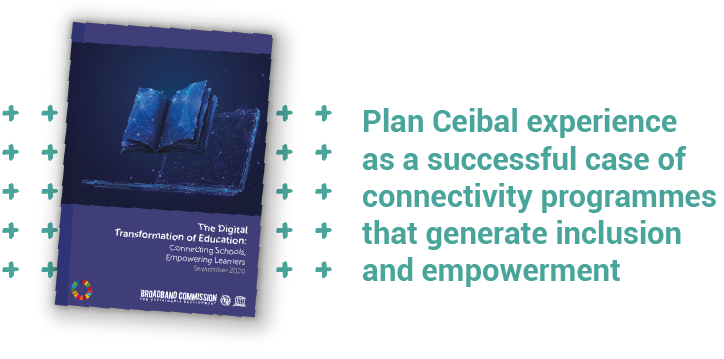Fundación Ceibal, organizations and specialist forums analyzed Plan Ceibal’s response to the education crisis, which received positive coverage internationally.The experience was picked up by publications of the Organization for Economic Cooperation and Development (OECD), the World Bank (WB), the Inter-American Development Bank (IDB), the Broadband Commission, the Finnish organization HundrED, dedicated to investigating innovations in the field of world education.
The Fundación Ceibal played a fundamental role in the systemization of Ceibal en casa (Ceibal at home), the analysis of monitoring and evaluation information produced by Plan Ceibal teams, and the international divulgation of innovations developed in Uruguay. One of the results of this work is the article Uruguay: Ceibal en Casa (Ceibal at home; Ripani, 2020 [1]), published by the OECD as part of the Continuity Stories series, in a joint work with the WB, HundrED and the University of Harvard to report on the experiences of countries that, using technology and with support for teachers, students and families, succeeded in providing educational continuity during the crisis caused by the coronavirus pandemic. This article had a major impact in the national and international press and served as the basis for other articles by third parties and Ceibal itself, including the present publication.
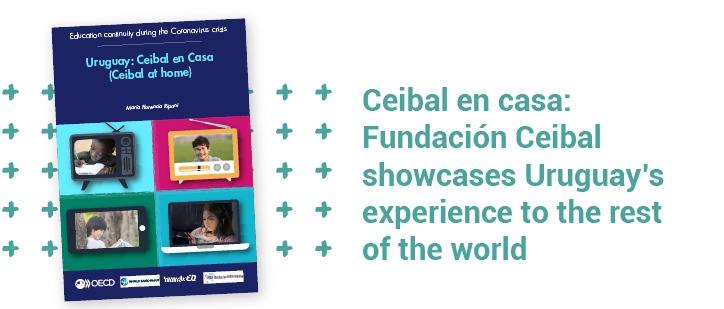
Written by Fundación Ceibal Director María Florencia Ripani, the article includes recommendations of the adaptation of Ceibal en casa in other countries, an analysis that was also addressed and shared in exchanges with public policy makers in the region, in the context of the Alliance for the Digitalization of Education in Latin America (Alianza para la Digitalización de la Educación en América Latina, ADELA), coordinated by the Fundación and funded by IDRC Canada.
Fundación Ceibal also presented Ceibal en casa in the context of its participation as an expert institution in the Broadband Commission Working Group on School Connectivity, organized by UNESCO, UNICEF and the International Telecommunications Union (ITU) through the Broadband Commission for Sustainable Development, a consultant and key advocacy group for the implementation of projects related to digital education all over the world, run by the three UN organizations.
As a result, the final report of this group, “The Digital Transformation of Education: Connecting Schools, Empowering Learners,”[2] takes the Plan Ceibal experience as a successful case of connectivity programmes that generate inclusion and empowerment among children, young people and the community as whole. The publication highlights the policy of constant monitoring, updating educational resources and improvements in the systems used by Ceibal, highlighting as an example Ceibal en casa and some of its innovations, such as the introduction of the videoconference service on the CREA platform.
There follows below a selection of other specialist publications that mention the Plan Ceibal experience in 2020.
La educación en tiempos del coronavirus: Los sistemas educativos de América Latina y el Caribe ante COVID-19 (Education in times of coronavirus: Education systems in Latin America and the Caribbean during COVID-19)
This IDB document presents the actions taken by the countries in the region in terms of the continuity of the education system during school closures caused by COVID-19. It analyzes the base conditions that the countries started out from to provide distance leaning.
In Uruguay’s case, the report mentions that the base was taken as the technological infrastructure developed through the Plan Ceibal, and that it is the only country in the region that has an integrated platform to administer student learning, which was a key resource in transitioning from in-person classes to online classes immediately. [3]
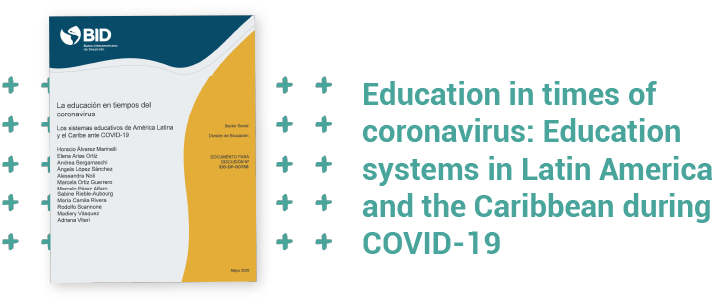
De la educación a distancia a la híbrida: 4 elementos clave para hacerla realidad. (From distance education to hybrid education: 4 key elements to make it a reality.)
The Plan Ceibal experience is given as an example of good practices in the report by the Education Division of the Inter-American Development Bank (IDB): “De la educación a distancia a la híbrida: 4 elementos clave para hacerla realidad”. (“From distance education to hybrid education: 4 key elements to make it a reality.”)[4]
The document suggests that Uruguay was better prepared than other countries in the region for distance learning and that it was able to mitigate the effects of school closures with the implementation of the Ceibal en casa programme, which in addition to providing content, initiated actions to support students, teachers and families. The report highlights that Uruguay was the only country in Latin America and the Caribbean that had high enough basic digital conditions for distance learning online.
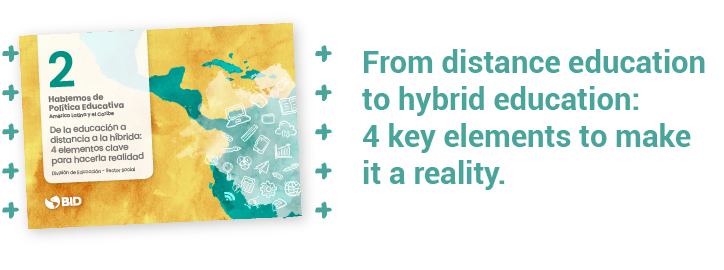
Un nuevo escenario educativo: los desafíos del COVID-19 y la transición hacia una educación combinada. (A new education scenario: the challenges of COVID-19 and the transition towards a combined education.)
The journal +Aprendizajes [5] of the Fundación Ceibal addressed the new educational scenario as a central theme in its 2020 edition. It covers over various articles the contingency strategy implemented by the Plan Ceibal in Uruguay, and the perspective of teachers, students and families towards the cancellation of in-person classes.
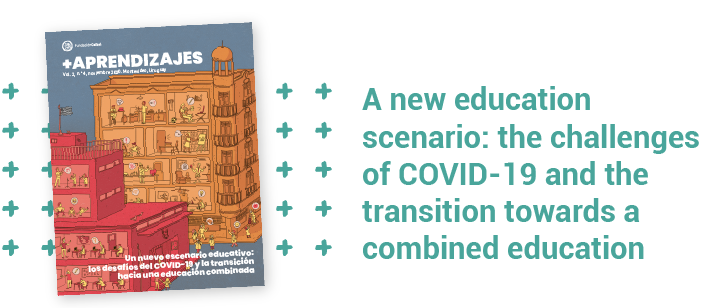
“Enfoque Educación”, Blog de la División de Educación del BID. (“Education Focus,” IDB Education Division blog.
The Ceibal en casa experience was covered and highlighted in various articles published in the blog “Enfoque Educación” (“Education Focus”), a space where IDB specialists and guest authors share their reflections, experiences and knowledge to encourage debate on education issues among policy makers, experts, teachers and parents.
Cierre de escuelas: el desafío que el COVID-19 impuso a los sistemas educativos de ALC. (School closures: the COVID-19 challenge for education systems in Latin America and the Caribbean.)
Uruguay: el primer país de Latinoamérica en reabrir su sistema educativo
(Uruguay: the first country in Latin America to reopen its education system.)
Una estrategia multimedia en nuevos contextos educativos: La experiencia de Plan Ceibal.
(A multimedia strategy in new education contexts: the Plan Ceibal experience.)
Tecnología: Lo que puede y no puede hacer por la educación.
(Technology: What it can and can’t do for education.)
COVID-19 y la gran apuesta del aprendizaje desde casa: ¿funcionará para todos?
(COVID-19 and the move towards learning from home: will it work for everyone?)
1. Ripani. M. (2020), Uruguay: Ceibal en Casa (Ceibal at home), Education continuity stories series, OECD Publishing, Paris.
2. International Telecommunication Union, United Nations Educational, Scientific and Cultural Organization, and United Nations Children’s Fund (2020), The Digital Transformation of Education: Connecting Schools,Empowering Learners, Ginebra.
3. Horacio Álvarez Marinelli, Elena Arias Ortiz, Andrea Bergamaschi, Ángela López Sánchez, Alessandra Noli, Marcela Ortiz Guerrero, Marcelo Pérez-Alfaro, Sabine Rieble-Aubourg, María Camila Rivera, Rodolfo Scannone, Madiery Vásquez and Adriana Viteri, Inter-American Development Bank (2020), La educación en tiempos del coronavirus: Los sistemas educativos de América Latina y el Caribe ante COVID-19 (Education in times of coronavirus: The education systems of Latin America and the Caribbean during COVID-19.)
4. Elena Arias Ortiz, Miguel Brechner, Marcelo Pérez Alfaro and Madiery Vásquez, Inter-American Development Bank (2020), De la educación a distancia a la híbrida: 4 elementos clave para hacerla realidad (From distance education to hybrid education: 4 key elements to make it a reality.)
5. Fundación Ceibal (2020, November). Un nuevo escenario educativo: los desafíos del COVID-19 y la transición hacia una educación combinada (A new education scenario: the challenges of COVID-19 and the transition to a combined education.) +Aprendizajes. 2 (4)


